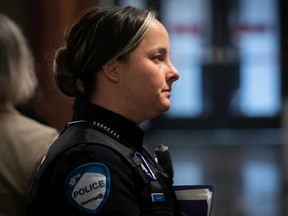Montreal cop in fatal intervention lacked de-escalation training
"I really believed I was going to die in that house," Const. Karine Bujold tells a coroner's inquest.

Article content
The first officer who made contact with an Île-Bizard man who died during a police intervention in 2017 was not trained to de-escalate situations — and, five years later, still has not been trained.
Montreal police officer Karine Bujold made the revelation on Tuesday while being questioned during the second day of hearings for the coroner’s inquest into the death of Koray Kevin Celik, 28.
Bujold was the second of four Montreal police officers involved in the intervention to testify during the inquest, preceded by Alexandre Bélair on Monday and followed by Jérôme Babin Tuesday afternoon. The fourth officer, Jérôme Brassard, is scheduled to testify Wednesday before the inquest moves onto other parties — such as paramedics and experts in the use of force — for the rest of the week.
Bujold, a police officer of nine years, delivered an emotional testimony at the Montreal courthouse of the events leading up to Celik’s death on March 6, 2017. She occasionally had to pause to regain composure.
“I really believed I was going to die in that house,” Bujold said through tears.
The police intervention came after a 911 call was placed by Celik’s parents, who attempted to console their son while he was intoxicated and in a state of crisis. When Celik started talking about driving away, his parents hid the car keys. But Celik found a spare set, so the parents called the Montreal police. Their son died of heart failure during the ensuing police intervention.
In her testimony, Bujold described entering the house first while other officers were talking to Celik’s father in the driveway. She said she went inside because she noticed Celik’s mother was by herself and wanted to make sure she was OK. When Bujold asked Celik’s mother where her son was, she said she simply turned around and made her way down a dark hallway.
Bujold followed her — a move coroner Luc Malouin questioned, saying she put her life in danger by blindly following instead of asking for more information.
“It’s not a reproach,” Malouin clarified, saying officers should put their own safety first.
When Bujold and Celik’s mother, June Tyler, met the man at his bedroom door, Bujold said she had her flashlight pointed at his chest, which appeared to upset him. He charged toward her, she said.
Bujold said she backed up in the hallway as Celik moved closer and, feeling threatened, eventually hit him in the thigh with her baton. That didn’t deter him, she said, and the other officers, who had come inside, rushed past her to tackle Celik to the ground before he could charge toward her again.
While Celik was face down on the ground, Bujold said she attempted to free his arms so she could handcuff him. By the time he was handcuffed and officers flipped him over — the span of a minute, Bujold said — he was blue in the face, which she said came as a shock. She said officers immediately tried to reanimate him and called paramedics.
Celik’s parents, who witnessed the entirety of what transpired, have described the events very differently, particularly with regard to the use of force by the officers.
Tyler has previously said that after rushing into the house after Bujold, all officers took out their batons and hit her son in the legs, making him collapse face down. There, she said, an officer placed Celik’s head between his knees while another cuffed his hands behind his back. She said the officers delivered several knees and strikes to his sides while one kept his hands over Celik’s mouth. Both parents screamed for them to stop.
It was chaos, and then, all of a sudden, it was silent, Tyler said. The officers turned Celik around, and he wasn’t breathing anymore.
Bujold, for her part, said on Tuesday she did not see any officers hit Celik while he was on the ground, but acknowledged that does not necessarily mean that they didn’t.
Babin, who testified later in the afternoon, provided a version of events similar to Bujold’s, while adding detail on how Celik ended up on the ground. He recalled intervening when he noticed Celik was about to charge Bujold for a second time, prompting him to pin him to the wall before attempting to guide him toward the ground. Babin described Celik as visibly angry and said he lost his balance on his way down.
While questioning Babin, Alexandre Popovic, who is intervening in the inquiry on behalf of the Coalition contre la répression et les abus policiers (CRAP), brought up a past Montreal Gazette article in which a person accused Babin and another officer of racial profiling and excessive use of force.
“I don’t see the use of this,” Malouin interjected. “You’re talking about racial profiling? What’s the link between racial profiling and our file?”
Popovic acknowledged there was no racial profiling in Celik’s case, “but there was a question of police brutality in the article.”
Malouin reiterated that while such a reference could be useful in some cases, he did not find it “pertinent” in Celik’s file.
“If we exclude the declarations from the parents,” Popovic responded.
An autopsy report had revealed Celik died of cardiorespiratory arrest “not resulting from the intervention of a third party, but from intoxication or an adverse reaction to a combination of intoxicating substances, and this, in the context of agitated delirium.”
Celik’s parents were scheduled to testify Monday but refused, calling the inquest a “circus act” following years of disappointment from authorities regarding their son’s case.
The coroner’s inquest aims to shed light on the circumstances of the event in the goal of making recommendations on how to avoid such situations in the future. Hearings are to take place until Friday, and recommendations are expected toward the end of November.
With files from Jesse Feith and Jason Magder of the Montreal Gazette.









Postmedia is committed to maintaining a lively but civil forum for discussion. Please keep comments relevant and respectful. Comments may take up to an hour to appear on the site. You will receive an email if there is a reply to your comment, an update to a thread you follow or if a user you follow comments. Visit our Community Guidelines for more information.